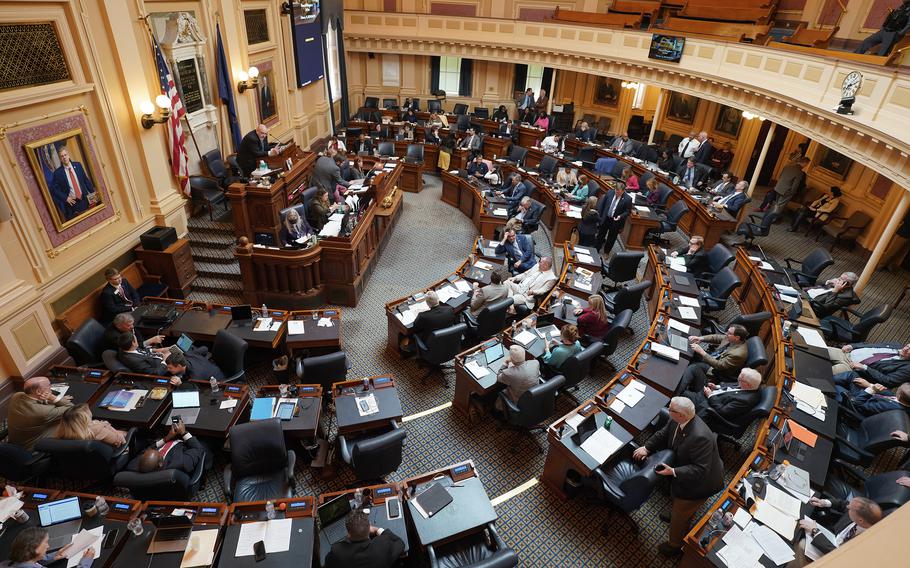
The House of Delegates meets during a session of the Virginia General Assembly in Richmond on Feb. 24, 2023. (Jay Paul, The Virginian-Pilot/TNS)
(Tribune News Service) — For the first time, Virginia Gov. Glenn Youngkin is considering major changes to the military survivor and dependent tuition waiver to offset millions of dollars in lost revenue for Virginia colleges.
Virginia’s Military Survivor and Dependent Education Program provides a tuition waiver to spouses and children of veterans who are killed, missing in action, taken prisoner or at least 90% permanently disabled as a result of military service or combat. The program also provides up to a $2,200 annual stipend to offset the costs of room, board, books and supplies for qualified survivors and dependents of military service members.
Hampton Roads universities and others across the state have been forced to absorb the lost revenue or spread the cost of the waiver to other students, the State Council of Higher Education for Virginia said in its state budget recommendations.
“The program has represented lost tuition revenue for the institutions since inception but was largely manageable until the last few years, when growth ranged between 43% to 62% year-over-year for four consecutive years and is projected to continue to grow,” said Lee Andes, interim director of the State Council of Higher Education for Virginia.
To combat this, the higher education council secured $20 million per year from lawmakers in the two-year budget bill that is meant to offset institutions’ loss of revenue from the military survivor and dependent program. Additional reforms proposed by the state agency could limit eligibility to undergraduate Virginia students to slow the growth and rising costs of the program.
The proposed changes represent the first time a funding offset to the institutions has been considered, Andes said.
The estimated cost of the program’s tuition waivers has nearly quadrupled, from $12 million in 2019 to $46.3 million in 2022, according to the council. Current projections show the lost tuition revenue will likely grow to over $190 million by 2026.
“How long this rate of growth can be sustained is unknown,” the agency’s budget recommendation says.
For Christopher Newport University, tuition and mandatory fee waivers associated with the program have increased tenfold from $300,000 in 2017-18 to more than $3 million in 2023-24, said Jim Hanchett, CNU spokesperson.
“We support and celebrate this program, and funding is needed to ensure the burden is not passed along to tuition-paying students,” Hanchett said.
In South Hampton Roads, the cost surged from $2 million in 2019-20 to more than $9 million in 2023-24 for Old Dominion University, said Amber Kennedy, ODU spokesperson. Kennedy said the cost is projected to exceed $13 million in the upcoming school year.
“Without any reform, program expenses will continue to be covered by university resources, including tuition and fee revenue from other students,” Kennedy said.
Andes said unknown factors make it difficult to quantify how much proposed policy reforms might control the growing cost of Virginia’s Military Survivor and Dependent Education Program.
One of the proposed reforms is cutting graduate students. In 2022, graduate programs cost $7.3 million, or 16% of the total cost of the program, according to the higher education council.
Restricting the program to undergraduate Virginia students means fewer people will qualify for the waiver, but Andes said it is unknown how many would be ineligible in the upcoming year.
Language in the budget bill would also require students to apply to receive state and federal tuition aid. Any tuition aid received would go to the institution, and the remaining amount of tuition would be waived.
“We have no way of knowing how much the state award will be if it were calculated first. More importantly, over half of the waiver recipients did not complete a federal FAFSA form, so we don’t know how many of them will file the application moving forward or how much federal or state aid they might subsequently receive,” Andes said, referring to the Free Application for Federal Student Aid.
The proposal includes a hold harmless provision that will delay making students ineligible if they are using the benefit in the current 2023-24 award year.
The budget bill includes $9,680,000 per year from the general fund to support the stipend provided to students under the Virginia Military Survivors and Dependents program. Andes said at this time, that funding seems secure.
The proposed changes, including student eligibility and $20 million to offset the cost of the program, are under review by the governor’s office. During this time, the proposals can be approved, amended or vetoed. If approved, the changes would be effective July 1, and the higher education council would be required to create guidance by Aug. 1.
©2024 The Virginian-Pilot.
Visit pilotonline.com.
Distributed by Tribune Content Agency, LLC.